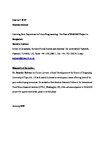Learning from experience in urban programming: the case of SHAHAR project in Bangladesh
Date
2009Author
Subject
Metadata
Show full item recordAbstract
The article offers a reflective analysis of various problems encountered and lessons learned in implementing a programme to improve the livelihood security of the urban poor in secondary cities of Bangladesh. The study is based on the author's involvement as an external action-research partner, and a review of relevant secondary literature. A number of key lessons emerge for the success of project operations. These are the need for (1) a clear understanding of the links between project activities and project objectives by all staff; (2) capacity building for all staff tailored to their needs; (3) clear targeting criteria and programme coverage; (4) a full complement of operational guidelines, work plans, and monitoring and evaluation design before implementation; (5) ensuring 'partnership of organisations' not 'partnership of activities'; (6) ensuring the real involvement of beneficiaries in all aspects of the project; (7) staff empowerment and a flexible approach to operations; (8) routine reflections on project progress; and finally (9) being ready to take bold steps and make necessary strategic changes, even if doing so requires significant deviations from pre-set activities and hypothetical schedules as featured in the project proposals.
Publisher
Place of Publication
Journal
Volume
Issue
Pagination
Recommended, similar items
The following license files are associated with this item:


